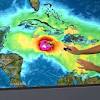Azerbaijan Airlines plane crash in Kazakhstan "does not look like ...

Speculation was mounting Friday that Russia's military could have had a role in the Azerbaijan Airlines plane crash that killed 38 people and left 29 survivors injured in Kazakhstan on Christmas Day, with experts casting doubt on Moscow's suggestion that a bird strike was to blame.
Azerbaijan Airlines Flight 8243, an Embraer 190 aircraft, was flying from the Azerbaijani capital of Baku to the city of Grozny in Russia's North Caucasus region Wednesday when it was diverted for reasons that were still unclear two days later. At some point during the flight the plane's GPS tracking was reportedly jammed, leading to significant deviations in the flightpath.
The plane crashed while trying to reach another airport in Aktau, in western Kazakhstan, after flying east across the Caspian Sea. It came down and burst into a ball of flames only about two miles from the Aktau airport.

Kazakhstan, Azerbaijan and Russia all opened investigations into the cause of the crash, but it was Russia facing the most pointed questions two days later. The Kremlin has urged people not to jump to conclusions, and President Ilham Aliyev of Azerbaijan, who's forged closer ties between his country and Russia during his two decades in power, also said it was too soon to speculate.
"The information provided to me is that the plane changed its course between Baku and Grozny due to worsening weather conditions and headed to Aktau airport, where it crashed upon landing," he said, as Russia's civil aviation authority, Rosaviatsia, suggested the bird strike theory.
But a U.S. official told CBS News there were early indications a Russian anti-aircraft system may have struck the plane in a region where Ukrainian and Russian forces have traded drone and rocket fire for months. The official, who spoke to CBS News on the condition of anonymity, said if that proved to be true, it would further underscore Russia's recklessness in its ongoing invasion of Ukraine.
White House National Security Council spokesman John Kirby told reporters on Friday that U.S. officials "have seen some early indications that would certainly point to the possibility that this jet was brought down by Russian air defense systems."
He confirmed to reporters the United States has intelligence or information pointing to the possibility but said Kazakhstan and Azerbaijan are currently conducting an investigation and the U.S. will "respect that process."
Kirby said President Biden has been apprised of the situation and the United States has offered assistance to the Azerbaijani government.
"We stand ready and willing to help them, should they need it with their investigation," he said.
Independent aviation experts were also casting doubt on the bird strike theory, and pointing to damage seen on the plane's fuselage as evidence of a more nefarious possible explanation.

"It certainly does not look like a flock of birds," said CBS News aviation safety analyst Robert Sumwalt, a former chairman of the National Transportation Safety Board.
"Birds don't fly at the type of an altitude that the initial damage occurred on this airplane," added Sumwalt.
Instead, the damage bears the hallmarks of shrapnel from an airborne weapon, and British military veteran and security analyst Justin Crump told CBS News' partner network BBC News that "the most likely hypothesis is that it was struck by an air defense missile — almost certainly Russian."
Azerbaijan Airlines and Russia react to crash in Kazakhstan
Azerbaijan Airlines, in a statement reported by international news agencies on Friday, said the plane experienced "external physical and technical interference" during its flight, without offering further information.
Dmitry Yadrov, the head of Russia's national aviation agency Rosaviatsia, said in a statement Friday that the Azerbaijani plane crashed during or after a Ukrainian drone attack around Grozny, where it had been scheduled to land. According to The Associated Press, Yadrov said "the situation in the area of Grozny airport was quite difficult" at the time, citing both the purported Ukrainian drone attack and heavy fog in the region.
He did not specifically address claims that the passenger jet had been hit by Russian air defenses.
Speaking to reporters on a conference call, Kremlin spokesman Dmitry Peskov also declined to comment Friday on the claims of possible Russian involvement in the crash, saying it would be up to investigators to determine the cause.
Some survivors of the crash said they heard an explosion before the plane went down.
"Ukrainian drones were active at the time, and this is commensurate with everything we've seen with the pilots' communication with air traffic control," Crump told the BBC.

Ukraine has relied heavily on explosive drones to hit Russian military and infrastructure targets inside the much larger neighboring country's western territory over the last year, and Russia often shoots the weapons down with its air defense systems.
For many observers, the circumstances of the Azerbaijan Airlines crash and the damage to the plane's wreckage recalled the downing of Malaysia Airlines Flight 17 in 2014. That passenger jet was hit by a missile launched by Russian-backed forces over Eastern Ukraine, killing all 298 people on board. Among those desperate for answers in the most recent disaster in Kazakhstan are the survivors of the crash, including one man who said from a hospital bed that he's been sitting next to his wife on the plane when it crashed.
"I haven't seen my wife since," he said. Investigators have recovered both of the so-called "black boxes" — the flight data and cockpit voice recorders — from the crash site. Experts from Brazil, where the plane was built, were due to arrive in Kazakhstan Friday to help retrieve and analyze the information from them.
As the formal investigations ramped up, Ukraine's government called on Friday for Russia to be held accountable for the crash, as Azerbaijan Airlines reportedly halted scheduled services to seven cities in Russia.
Sara Cook contributed to this report.
More
Chris Livesay is a CBS News foreign correspondent based in Rome.


 Australia
Australia Argentina
Argentina  Austria
Austria  Brazil
Brazil  Canada
Canada  Germany
Germany  Ireland
Ireland  Italy
Italy  Malaysia
Malaysia  Mexico
Mexico  New Zealand
New Zealand  Poland
Poland  South Africa
South Africa  United Kingdom
United Kingdom  United States
United States 




























